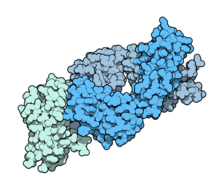 | |
| Monoclonal antibody | |
|---|---|
| Type | Whole antibody |
| Source | Human |
| Target | CTLA-4 |
| Clinical data | |
| Pronunciation | i pi lim′ ue mab |
| Trade names | Yervoy |
| Other names | BMS-734016,[1] MDX-010,[2] MDX-101 |
| AHFS/Drugs.com | Monograph |
| MedlinePlus | a611023 |
| License data |
|
| Pregnancy category |
|
| Routes of administration | Intravenous (IV) |
| ATC code | |
| Legal status | |
| Legal status | |
| Pharmacokinetic data | |
| Elimination half-life | 15 days[7] |
| Identifiers | |
| CAS Number | |
| DrugBank | |
| ChemSpider |
|
| UNII | |
| KEGG | |
| ChEMBL | |
| Chemical and physical data | |
| Formula | C6742H9972N1732O2004S40 |
| Molar mass | 148634.46 g·mol−1 |
| | |
Ipilimumab, sold under the brand name Yervoy, is a monoclonal antibody medication that works to activate the immune system by targeting CTLA-4, a protein receptor that downregulates the immune system.
Cytotoxic T lymphocytes (CTLs) can recognize and destroy cancer cells. However, an inhibitory mechanism interrupts this destruction.[8] Ipilimumab turns off this inhibitory mechanism and boosts the body's immune response against cancer cells.[8][9]
Ipilimumab was approved by the US Food and Drug Administration (FDA) in March 2011, for the treatment of melanoma, renal cell carcinoma (RCC), colorectal cancer, hepatocellular carcinoma, non-small cell lung cancer (NSCLC), malignant pleural mesothelioma, esophageal cancer.[10][11][12][13] It is undergoing[when?] clinical trials for the treatment of bladder cancer[14] and metastatic hormone-refractory prostate cancer.[15]
The concept of using anti-CTLA4 antibodies to treat cancer was first developed by James P. Allison while he was director of the Cancer Research Laboratory at the University of California, Berkeley.[16][17] Clinical development of anti-CTLA4 was initiated by Medarex, which was later acquired by Bristol-Myers Squibb. For his work in developing ipilimumab, Allison was awarded the Lasker Award in 2015.[18] Allison later was the co-winner of the 2018 Nobel Prize in Physiology or Medicine.[19]
- ^ "Yervoy, ipilimumab (BMS-734016) - Product Profile - BioCentury". BioCentury Online Intelligence. BioCentury Publications. Retrieved 11 August 2016.
- ^ USAN. "STATEMENT ON A NONPROPRIETARY NAME ADOPTED BY THE USAN COUNCIL - ipilimumab" (Press release). American Medical Association (AMA). Archived from the original on 2016-02-23. Retrieved 2013-01-12.
- ^ "Regulatory Decision Summary for Yervoy". Drug and Health Products Portal. 7 December 2023. Retrieved 2 April 2024.
- ^ "Yervoy 5 mg/ml concentrate for solution for infusion - Summary of Product Characteristics (SmPC)". (emc). 3 August 2020. Retrieved 2 October 2020.
- ^ "Yervoy- ipilimumab injection". DailyMed. 13 August 2020. Retrieved 2 October 2020.
- ^ "Yervoy EPAR". European Medicines Agency (EMA). 17 September 2018. Retrieved 2 October 2020.
- ^ "Ipilimumab: Uses, Interactions, Mechanism of Action". DrugBank Online. 25 March 2011. Retrieved 18 September 2024.
- ^ a b Syn NL, Teng MW, Mok TS, Soo RA (December 2017). "De-novo and acquired resistance to immune checkpoint targeting". The Lancet. Oncology. 18 (12): e731–e741. doi:10.1016/s1470-2045(17)30607-1. PMID 29208439.
- ^ Cite error: The named reference
Ribaswas invoked but never defined (see the help page). - ^ "Yervoy". Opdivo. Bristol Myers Squibb. Retrieved 7 February 2024.
- ^ "Drug Approval Package: Yervoy (ipilimumab) Injection NDA #125377". U.S. Food and Drug Administration (FDA). 24 December 1999. Retrieved 2 October 2020.
- ^ Lacroix M (2014). Targeted Therapies in Cancer. Hauppauge, NY: Nova Sciences Publishers. ISBN 978-1-63321-687-7. Archived from the original on 2015-06-26. Retrieved 2014-07-13.
- ^ Pollack A (May 29, 2015). "New Class of Drugs Shows More Promise in Treating Cancer". New York Times. Retrieved May 30, 2015.
- ^ Clinical trial number NCT01524991 for "First-Line Gemcitabine, Cisplatin + Ipilimumab for Metastatic Urothelial Carcinoma" at ClinicalTrials.gov (completed)
- ^ Clinical trial number NCT00323882 for "Phase I/II Study of MDX-010 in Patients With Metastatic Hormone-Refractory Prostate Cancer (MDX010-21)" at ClinicalTrials.gov (completed)
- ^ Leach DR, Krummel MF, Allison JP (March 1996). "Enhancement of antitumor immunity by CTLA-4 blockade". Science. 271 (5256): 1734–1736. Bibcode:1996Sci...271.1734L. doi:10.1126/science.271.5256.1734. PMID 8596936. S2CID 7215817.
- ^ "UC Berkeley Cancer Research Lab » The Story of Yervoy (Ipilimumab)". crl.berkeley.edu.
- ^ Lasker Foundation. "Deep brain stimulation for Parkinson's disease". The Lasker Foundation.
- ^ "The Nobel Prize in Physiology or Medicine 2018 to James P. Allison and Tasuku Honjo". Archived from the original on 2018-12-24. Retrieved 2018-10-01.